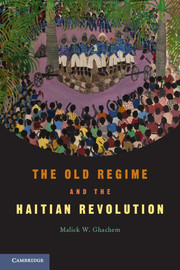Book contents
Conclusion
Published online by Cambridge University Press: 05 June 2012
Summary
The revolutionary transformation of the Code Noir did not end with the departure of Sonthonax and Polverel from Saint-Domingue in June 1794, to face trial in France concerning their conduct over the preceding two years. (Polverel died before the trial was over; Sonthonax was eventually acquitted of all charges in October 1795 and returned to the colony as head of a new civil commission in May 1796.) In the later 1790s, after control of Saint-Domingue had passed to Toussaint Louverture, the difficulties of reconciling a workable plantation economy with a meaningful commitment to liberty for the former slaves continued to complicate the effort to embed a rule of law in Saint-Domingue. The colony’s first black lawgiver would manage to creatively address, but not entirely transcend, those difficulties.
The story of Louverture’s rise to power between 1794 and 1800, well told in several recent accounts, need only briefly be summarized here. Critical to understanding the nature of the regime that Louverture would eventually consolidate is that this period was thoroughly dominated by war. Louverture’s apprenticeship in the exercise of colonial administrative power was overwhelmingly military in nature and consisted of two overlapping phases: a stage of foreign military occupation and then a period of internal struggle for power between various factions seeking to inherit the mantle of French control. Louverture’s decision to join the French republican forces, sometime between April and July 1794, made it possible for Sonthonax and Polverel to force a Spanish departure from Santo Domingo in July 1795. By the middle of 1798, that same alliance led to the eviction of the British – although not before Louverture succeeded in pressuring Sonthonax himself to depart the scene for one final time in August 1797. His European rivals all subdued, the black leader devoted most of 1799 and 1800 to vanquishing the forces of his free colored rival André Rigaud in the south. Rigaud himself fled in July 1800, and by the fall of that year, Louverture was in a position to exercise uncontested internal authority over the entirety of Hispaniola, subject only to the continued external claims of French sovereignty.
- Type
- Chapter
- Information
- The Old Regime and the Haitian Revolution , pp. 303 - 314Publisher: Cambridge University PressPrint publication year: 2012



